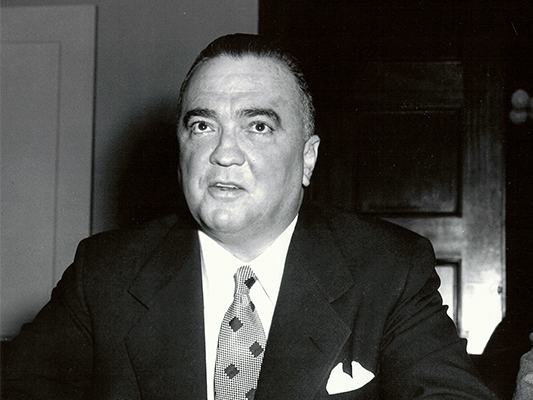J. Edgar Hoover

Born: January 1, 1895, Washington, D.C.
Died: May 2, 1972, Washington, D.C.
Nicknames: The Director, Speedy, Boss
Associations: FBI, President Kennedy, President Nixon
J. Edgar Hoover led the federal government’s campaigns against interstate crime for almost 50 years, amassing enormous political power during his career and along the way becoming a reluctant warrior against organized crime.
Hoover became the director of what was then known as the Bureau of Investigation in 1924 under President Calvin Coolidge. He maintained the title of director when the reorganized agency was renamed the Federal Bureau of Investigation in 1935, and kept the position until his death in 1972. During his tenure, Hoover collected confidential, personal information on many Americans, including presidents, members of Congress and other elected officials, and critics charge that Hoover used this information to embarrass, threaten and blackmail potential adversaries and politicians whom Hoover did not support.
Early in his career, Hoover helped popularize the federal “G-Man” as a gun-toting avenger going after bank robbers, kidnappers, and leftist labor agitators. Hoover used his considerable influence in Hollywood to ensure his agency was almost always portrayed in flattering ways.
His successes included the highly publicized killing of bank robber John Dillinger and other high-profile shootouts.
In the 1940s and 1950s, Hoover and the FBI led efforts to infiltrate and dismantle left-leaning political organizations, and his tactics – burglary, inciting criminal activity, secret wiretaps, planting false evidence and interception of mail without a warrant – often crossed over into legally questionable or outright illegal activity.
Hoover was known to occasionally bet – illegally, since Washington, D.C., had no legal sports-betting operations – on horse races. This is one reason why, critics say, Hoover for decades discounted the idea of a national Mob of organized crime. Hoover insisted local police should take the lead in going after gambling, prostitution, drug-smuggling and Prohibition-era alcohol rackets.
It took the Kefauver Committee hearings in 1950-51 to convince the FBI director that the national Syndicate did indeed have a coordinated, multistate presence that required federal intervention.
Perhaps ironically for a man who revealed to favored columnists and newsmen personal information such as rumors and innuendo about politicians whom he didn’t care for, Hoover was secretive in his personal life and rumored to be gay, although that was never proven.
Some of those about whom he collected information included civil rights leader Martin Luther King Jr., whom Hoover considered a dangerous political threat. Hoover sent King a letter claiming to be from a former supporter with evidence of sexual infidelity and which urged the civil rights leader to commit suicide.
Members of the Kennedy political dynasty, including President John F. Kennedy and his attorney general and brother, Robert Kennedy, were also targets of Hoover’s snooping. Hoover’s information apparently included wiretaps of the Kennedy men conducting illicit sexual affairs – and it’s interesting that both John F. and Robert Kennedy were Hoover’s bosses. Some biographers have suggested that Hoover’s voluminous secret files on elected officials, including presidents Truman, Kennedy, Johnson and Nixon, protected him from being fired.
His investigation of the assassination of President Kennedy in 1963 was specifically criticized for failure to investigate potential conspiracies by a special committee of the U.S. House of Representatives in 1976.
After his death, Hoover’s legacy tainted his undeniable successes at the FBI, most notably professionalizing the federal law enforcement work force and assembling a huge national database of criminals. Despite his somewhat checkered record, he is celebrated and honored by many, and the FBI building in Washington, D.C., was named in his honor.




